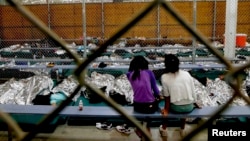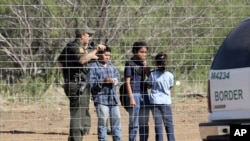HOUSTON, TEXAS —
At least 47,000 children have been apprehended since October while illegally crossing the southwest U.S. border with Mexico. The influx of the minors in recent weeks – mostly coming from Central America and traveling without a parent – has overwhelmed U.S. Border Patrol agents and Texas-area facilities set up to house detainees.
Hundreds of undocumented immigrant children are being held in detention centers near the border and many more have been sent to a special center established in Arizona.
The apprehension of undocumented minors presents complications. While Mexican citizens caught crossing the border illegally quickly get sent back and those from other countries are processed through the immigration court system. But by law, children cannot be sent back alone. They must be processed through the Office of Refugee Resettlement or put in the care of family members residing in the United States.
And, the Associated Press reports, Customs and Border Protection must transfer them to the Department of Health and Human Services within 72 hours. The department reportedly has more than 7,600 children in its care in more than 100 shelters nationwide.
Resettling and caring for the Central American children could cost up to $2.28 billion next year, The Los Angeles Times reported, citing administration officials.
The surging number of children in custody has created a logjam in administrative. The situation has frustrated Border Patrol agents and immigration officials, who’ve been told not to speak to the news media.
Shawn Moran, vice president of the National Border Patrol Council, a union, said agents patrolling in Texas’ Rio Grande area have reported unusual encounters recently.
Most of the time, people making illegal crossings "attempt to evade the Border Patrol" unless they’re injured, Moran said. Now, "Border Patrol agents are being actively sought out. People are waiting in very conspicuous places to be apprehended."
The White House explained the surge in apprehensions of unaccompanied minors by saying families in violence-torn countries such as El Salvador, Guatemala and Honduras are sending their children north to protect them.
That seemed to be the case at first, Moran said, but many of the detainees now say they came for another reason.
"Interviews with the detainees show that overwhelmingly, now, they are coming because they heard from a family member or a friend that the United States is no longer enforcing its immigration laws and that the United States is handing out what they term permisos, or permits, and allowing people to stay here in the U.S.," Moran said.
Border Patrol agents have seen evidence indicating the border crossings are being orchestrated by criminal gangs that engage in both drug smuggling and human trafficking, Moran said.
"We believe this is a coordinated activity by the cartels to tie up the Border Patrol so that they can push their drugs through," he explained.
Tristan Reed, Mexico security analyst for Stratfor, a global intelligence firm based in Austin, Texas, said drug cartels control crossings from the Mexican side of the border and could be taking advantage of the Central American immigrants.
"It is well within their ability to pick and choose who crosses and where they cross," Reed said, "and it certainly is a good opportunity for them to push more profitable drugs across the border while law enforcement is distracted."
Reed said crime and insecurity in Central American countries have created conditions not unlike those found in war-ravaged nations.
The drug wars, and the violence that accompanies the pursuit of ill-gotten gains, largely are to blame for people fleeing, he said.
There’s "money to be had for criminals, and especially when you start bringing in organized and very capable Mexican crime groups into Central America, it sort of helps organize and fuel these drug wars even more," Reed said.
Poverty and lack of economic opportunity in some Central American countries help explain why parents there would risk sending their children alone on the long journey across Mexico with the goal of crossing into the United States.
Hundreds of undocumented immigrant children are being held in detention centers near the border and many more have been sent to a special center established in Arizona.
The apprehension of undocumented minors presents complications. While Mexican citizens caught crossing the border illegally quickly get sent back and those from other countries are processed through the immigration court system. But by law, children cannot be sent back alone. They must be processed through the Office of Refugee Resettlement or put in the care of family members residing in the United States.
And, the Associated Press reports, Customs and Border Protection must transfer them to the Department of Health and Human Services within 72 hours. The department reportedly has more than 7,600 children in its care in more than 100 shelters nationwide.
Resettling and caring for the Central American children could cost up to $2.28 billion next year, The Los Angeles Times reported, citing administration officials.
The surging number of children in custody has created a logjam in administrative. The situation has frustrated Border Patrol agents and immigration officials, who’ve been told not to speak to the news media.
Shawn Moran, vice president of the National Border Patrol Council, a union, said agents patrolling in Texas’ Rio Grande area have reported unusual encounters recently.
Most of the time, people making illegal crossings "attempt to evade the Border Patrol" unless they’re injured, Moran said. Now, "Border Patrol agents are being actively sought out. People are waiting in very conspicuous places to be apprehended."
The White House explained the surge in apprehensions of unaccompanied minors by saying families in violence-torn countries such as El Salvador, Guatemala and Honduras are sending their children north to protect them.
That seemed to be the case at first, Moran said, but many of the detainees now say they came for another reason.
"Interviews with the detainees show that overwhelmingly, now, they are coming because they heard from a family member or a friend that the United States is no longer enforcing its immigration laws and that the United States is handing out what they term permisos, or permits, and allowing people to stay here in the U.S.," Moran said.
Border Patrol agents have seen evidence indicating the border crossings are being orchestrated by criminal gangs that engage in both drug smuggling and human trafficking, Moran said.
"We believe this is a coordinated activity by the cartels to tie up the Border Patrol so that they can push their drugs through," he explained.
Tristan Reed, Mexico security analyst for Stratfor, a global intelligence firm based in Austin, Texas, said drug cartels control crossings from the Mexican side of the border and could be taking advantage of the Central American immigrants.
"It is well within their ability to pick and choose who crosses and where they cross," Reed said, "and it certainly is a good opportunity for them to push more profitable drugs across the border while law enforcement is distracted."
Reed said crime and insecurity in Central American countries have created conditions not unlike those found in war-ravaged nations.
The drug wars, and the violence that accompanies the pursuit of ill-gotten gains, largely are to blame for people fleeing, he said.
There’s "money to be had for criminals, and especially when you start bringing in organized and very capable Mexican crime groups into Central America, it sort of helps organize and fuel these drug wars even more," Reed said.
Poverty and lack of economic opportunity in some Central American countries help explain why parents there would risk sending their children alone on the long journey across Mexico with the goal of crossing into the United States.





